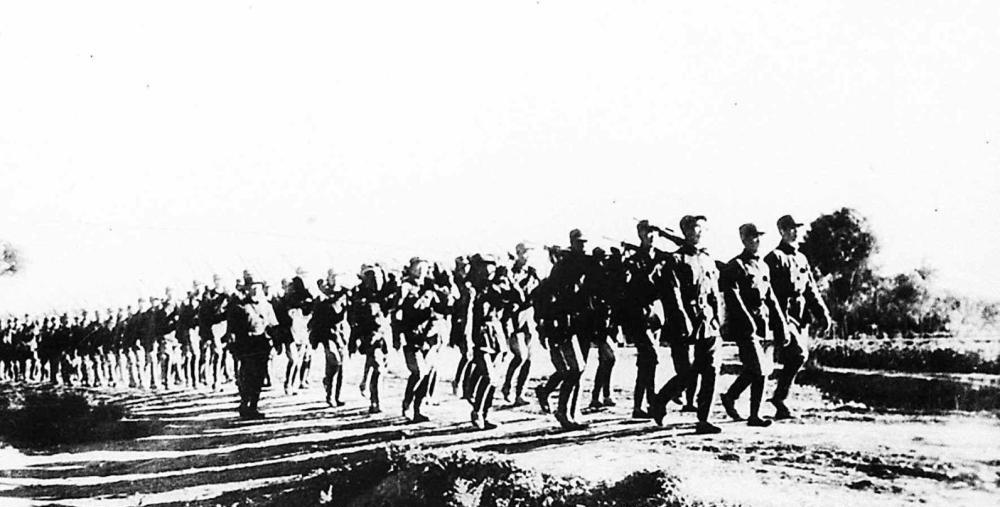In the Eighth Route Army, there was a brigade that was jokingly called the "Three Sons Unit" by its comrades-in-arms. Why is this unit dubbed the "Three Sons"? Let's tell you what this is all about.

This unit, which is a well-known unit in the Eighth Route Army, is the main force of the 386th Brigade of the 129th Division of the Eighth Route Army, which was reorganized from the 31st Army of the Red Fourth Front. The 386th Brigade participated in the famous battles of Changshengkou, Qiqi Village, Huangyadi, Shentouling, Xiangtangpu, and so on in the war of resistance against Japan, and the brigade commander in the early days of this brigade must have known that he was the later founding general Chen Geng, and in this heroic unit, there were many famous generals and fierce generals, such as Li Jukui, Wang Xinting, Chen Zaidao, Xu Shiyou, Zhou Xihan, Wang Jinshan, and so on.
Speaking of these "three sons," you must not have any "tickets," "women," "houses," and so on in the corrupt life of the Kuomintang reactionaries back then; real revolutionaries would not pursue such corrupt things; the "three sons" of the 386 Brigade are talking about the three principal responsible persons of this brigade, and each of them has a nickname, namely "crippled," "blind," and "skinny."
Known as the "cripple" was the brigade commander Chen Geng .
Chen Geng joined the party in 1922 and graduated from the first phase of Huangpu, but he fought on the battlefield for the anti-feudal and anti-warlord Eastern Expedition. After participating in the Nanchang Uprising in 1927, he served as a battalion commander in the 1st Battalion of the 6th Regiment of the 3rd Division of the 2nd Army of He Laozong, and was wounded in the left leg in the Battle of Huichang, which went south to Guangzhou. Although he was treated, he left a lifelong leg disease, and he walked with one turn and one turn, so he fell under the nickname of "crippled" in the Eighth Route Army.
Known as the "blind man" is the political commissar Wang Xinting.
Wang Xinting was born in Xiaogan, Hubei Province, a small industrial and commercial family, so in his youth he belonged to a family that could afford to go to school, so he may not pay attention to the method of reading, and read his eyes as highly myopic, if it were not for a pair of thick glasses like the bottom of a beer bottle, he would simply be blind. Therefore, everyone affectionately called him "blind".
Although Wang Xinting's eyesight was not good, it did not affect in the slightest the ability to distinguish politically and militarily in his future revolutionary work. Since he joined the Red 2 Army in 1930, he has successively held political work, from instructor, director of the organization department of the political department, to director of the political department, and then to political commissar, he experienced the Long March of the Red Fourth Front, the War of Resistance Against Japan and the War of Liberation, he was always loyal to the cause of the party and the people, conscientious, adhering to principles, taking into account the overall situation, frank and honest, and was awarded the rank of general in 1955.
Zhou Xihan, the brigade chief of staff known as the "skinny man".
Zhou Xihan was notoriously thin, and no matter how big the fish and meat were, he could not be fat, so he was called "thin man" in the military.
The so-called "lean and thin, martial arts master". After the revolution of 1928, Zhou Xihan became more and more courageous in the battlefield, whether it was the western expedition to the war, or participating in the anti-three-way siege and anti-six-way siege in the Revolutionary Base Area of Sichuan and Shaanxi, as well as the Long March, and later in the War of Resistance Against Japanese Aggression and the War of Liberation, he always showed a fearless revolutionary spirit.
In the Battle of the Hundred Regiments, the forward commander of the Eighth Route Army and the head organ of the Northern Bureau were retreating to The Rolling Island Ditch, but only one guard battalion covered it, and the situation was extremely critical. At this critical juncture when the main position was lost, when Liu Shuai was worried that there were no troops to adjust at hand, he overheard that Zhou Xihan and his troops had rushed to Yangerling and engaged the Japanese army. Liu Shuai therefore also breathed a sigh of relief and said, "Well, this is Zhao Zilong coming." ”
In the later War of Liberation, Zhou Xihan led his troops to participate in a series of battles and campaigns such as advancing into the Central Plains, Huaihai, crossing the river, and liberating the great southwest, and made great achievements in crushing the US-Chiang clique. In 1955, Zhou Xihan was awarded the rank of vice admiral.
To sum up, the 386th Brigade of the 129th Division of the Eighth Route Army was derisively called the "Three Sons Unit" because it was caused by the physical defects of each of the three brigade commanders. This may be sprayed to death by netizens in contemporary society, but in the context of the times of that year, this kind of ridicule is a manifestation of the consistency and intimacy of officers and soldiers. Therefore, if you are lucky enough to see the small text, I hope that you will not spray the small editor.